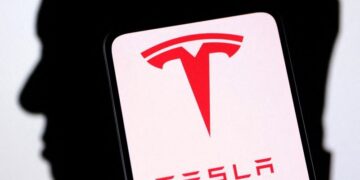If Donald Trump’s sweeping global tariffs send household good prices soaring and drive the economy into recession, at least one industry could profit.
The Trump administration is considering using tariff revenues to buy Bitcoin for a “Strategic Bitcoin Reserve,” a top administration crypto official said in an interview last week.
The White House’s proposal is driving interest from crypto industry figures who have made building the reserve one of their top priorities.
It is uniting critics on the right and left, however, who have cast the reserve as a pointless industry giveaway that will come at the expense of ordinary taxpayers. Using tariff money would add insult to injury, they say.
“There is nothing here but a conjunction of bad ideas,” said George Selgin, an economist and professor emeritus at the University of Georgia. “The tariffs are a bad idea, the Bitcoin Strategic Reserve is a bad idea, and using the tariff revenue for the Bitcoin Strategic Reserve is a bad idea.”
Reaping Revenue?
Ever since Trump proposed across-the-board tariffs on the campaign trail last year, he has touted the idea as a way to both build domestic industry and raise revenue.
Trump has suggested that tariff revenue could replace the nearly $5 trillion the government hauls in income tax revenue per year, while a top trade official in his administration estimated they could raise $6 to $7 trillion over a decade.
Both numbers are fantasies, according to economists of all political stripes. The nonpartisan Tax Policy Center said the massive tariffs — if they all go into effect as initially proposed on “Liberation Day” — could raise about $3.3 trillion over that period, assuming they don’t send the economy into a tailspin.
The relatively meager scale of the tariffs’ revenues has not stopped the Trump administration from cooking up ideas for how to spend them on everything from tax cuts for the rich to deficit reduction.
Last week, Bo Hines, the executive director of the Presidential Council of Advisers on Digital Assets, added another proposal to the mix. In an interview with investor and crypto influencer Anthony Pompliano, Hines said the administration could use tariff revenue to buy bitcoin.
“We are looking at many creative ways, whether it be from tariffs, whether it be from something else,” Hines said. “Everything is on the table, and like we have said, we want as much as we can get.”
The White House did not respond to a request for comment Friday.
Why Bitcoin?
When Trump announced that he wanted to create a “strategic reserve” of bitcoin at a crypto conference last July, it cemented his place as the industry’s favored presidential candidate.
Supporters have cast bitcoin as a modern-day gold with near-limitless future growth potential. Socking it away could protect against depreciation of the U.S. dollar and inflation, they say.
Trump followed through on his promise almost as soon as he was in office by creating the reserve — but he disappointed some bitcoin boosters by stocking it only with tokens that had already been seized by the government. Still, Trump promised that he would search for “budget-neutral” ways to buy more bitcoins.
Tariffs could be one way of building the store, according to Hines. But they would hardly be budget-neutral, Selgin said, since they are essentially a tax on the consumers buying imported goods.
The tariffs would have a disproportionate impact on low-income households, according to the Budget Lab at Yale University, which calculated they would cost an average household $3,800 per year.
Regardless of how they pay for it, critics say that it’s inappropriate for the government to buy up an asset like bitcoin with no inherent use that is subject to wild price swings — and, in fact, has dropped in price since Trump’s tariff announcement. If the government does wind up buying bitcoin, critics have warned, selling any substantial portion of it could depress the digital asset’s price.
“You have a lot of people in the bitcoin community, bitcoin bulls who would like to see the government do a lot more, because it will benefit them,” said Selgin, who also serves as a senior fellow at the libertarian Cato Institute. “These people are trying by hook or by crook to rationalize something that really is just a subsidy for them, without any benefits for other people.



















